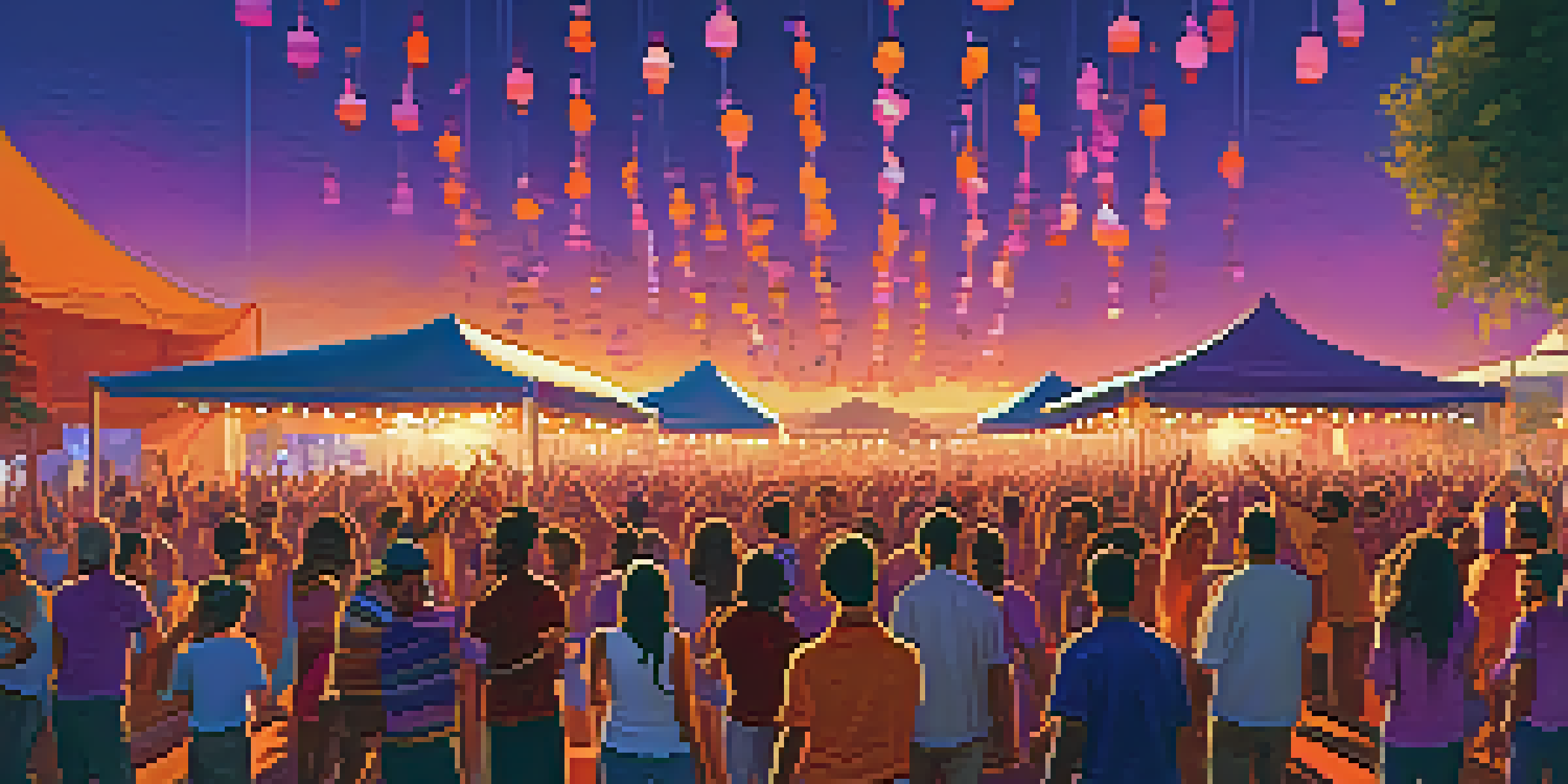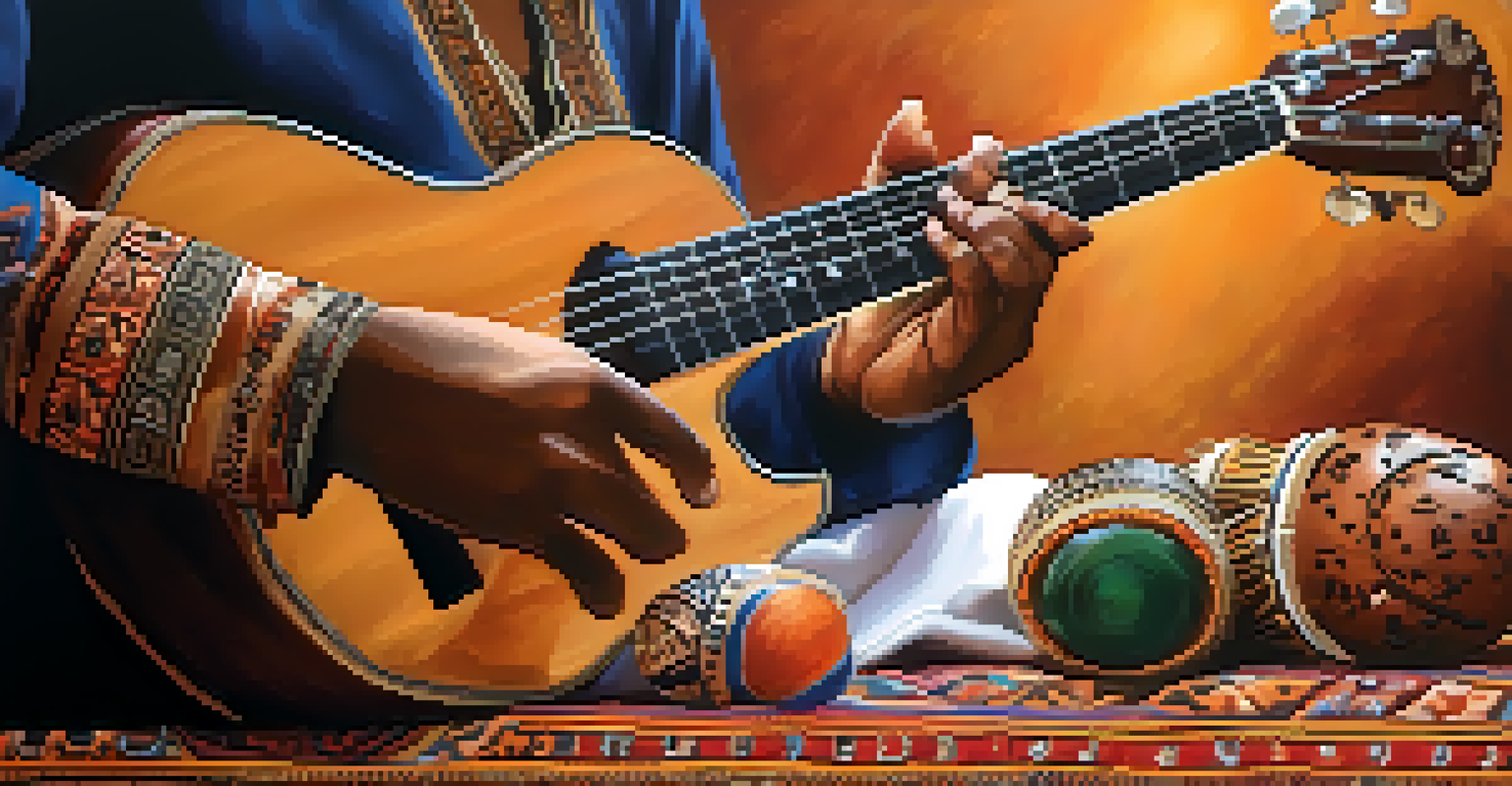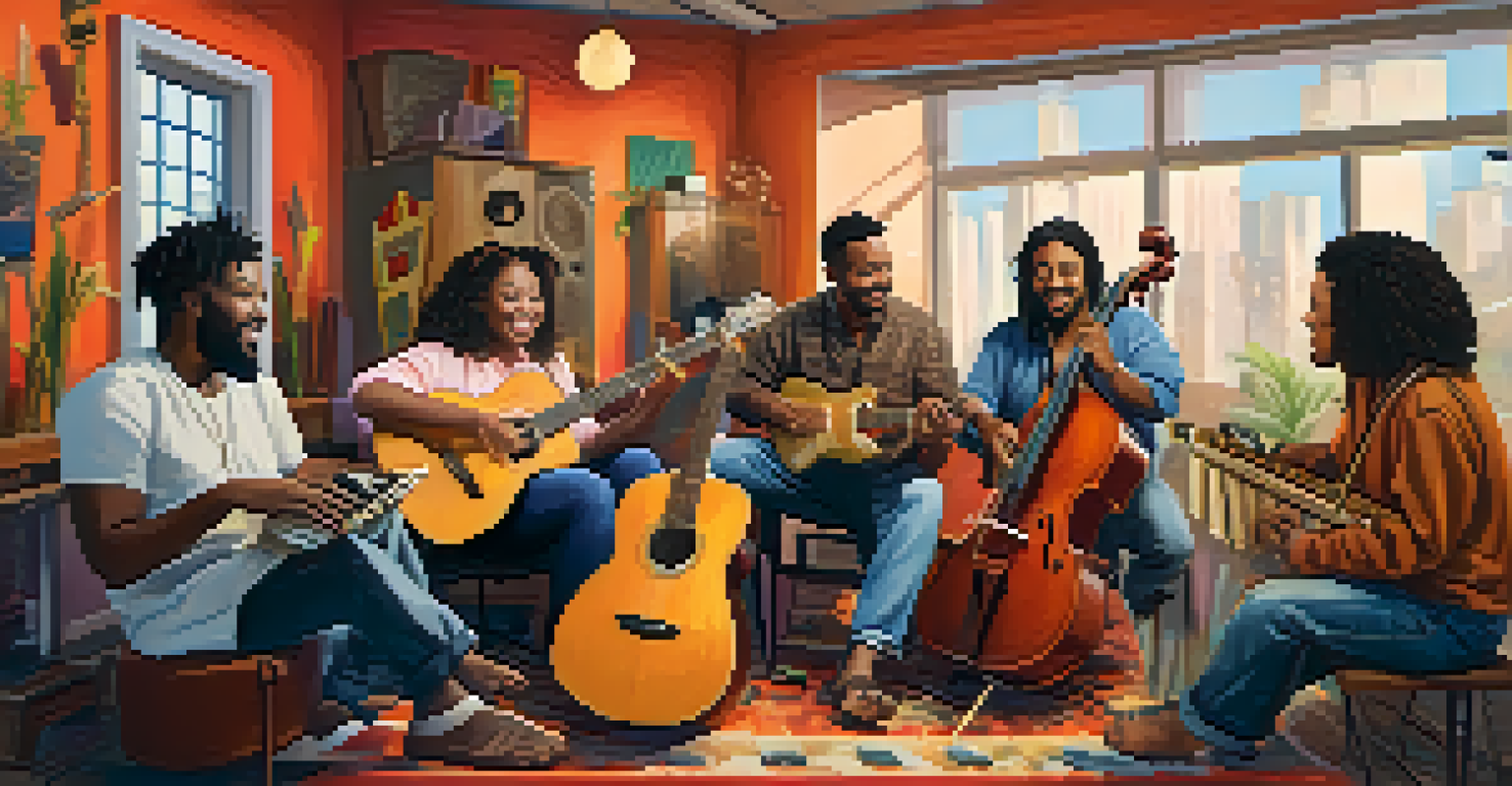How Music Bridges Cultural Gaps in Global Society

Music as a Universal Language Across Cultures
Music transcends linguistic barriers, acting as a universal language that connects people from different backgrounds. For instance, a heartfelt melody can evoke emotions that words often cannot express, making it easier to communicate feelings and thoughts. This shared experience of music allows individuals to bond over rhythms and tunes, regardless of their native tongue.
Music is the shorthand of emotion.
Think about how songs from different cultures often share similar themes, such as love, struggle, or celebration. This commonality makes it easier for people to relate to each other, fostering a sense of unity. When someone listens to a powerful song from a different culture, they may find themselves tapping their feet or swaying to the beat, creating an instant connection.
Moreover, international music festivals often showcase diverse genres, encouraging attendees to explore and appreciate cultural differences. These events not only celebrate musical diversity but also promote cultural exchange, allowing people to learn about each other's traditions through the power of sound.
Shared Experiences Through Music Events and Festivals
Music events and festivals bring people together, creating shared experiences that bridge cultural divides. Whether it's a local concert or a global festival like Coachella, attendees often find common ground in their love for music. This shared passion fosters an atmosphere of acceptance and celebration, where differences are embraced rather than feared.

For example, the annual Woodstock Festival in the U.S. became a symbol of peace and unity during a tumultuous time in history. People from diverse backgrounds gathered to enjoy music, dance, and express their views on social issues. Such events demonstrate how music can serve as a catalyst for change and understanding in society.
Music Connects Across Cultures
Music transcends language barriers, fostering emotional connections and shared experiences among people from diverse backgrounds.
Additionally, collaborative performances featuring artists from various cultures can create a powerful message of unity. When musicians from different backgrounds come together on stage, they not only showcase their unique styles but also create a harmonious blend that resonates with audiences worldwide.
Music as a Tool for Cultural Exchange and Understanding
Music acts as a conduit for cultural exchange, allowing individuals to learn about and appreciate different traditions. When artists incorporate elements from various cultures into their work, they create a dialogue that encourages listeners to explore new perspectives. This blending of styles often leads to innovative sounds that reflect the beauty of diversity.
Without music, life would be a mistake.
Consider the growing popularity of genres like Reggaeton, which fuses Latin rhythms with hip-hop and dancehall influences. This genre not only showcases the rich cultural heritage of its roots but also invites listeners from around the world to engage with it. By embracing and celebrating these cross-cultural influences, music helps to break down preconceived notions and stereotypes.
Moreover, educational programs that focus on music from various cultures can enhance understanding among different communities. By teaching children about global music traditions, we foster empathy and appreciation for diversity from an early age, ensuring that future generations continue to value cultural exchange.
The Role of Technology in Connecting Musicians Worldwide
In today's digital age, technology plays a crucial role in connecting musicians from different parts of the world. Platforms like YouTube, Spotify, and social media enable artists to share their work with a global audience, breaking traditional barriers to entry. This connectivity allows for collaborative projects that blend various musical influences, enriching the global soundscape.
For example, the rise of online collaborations has led to unique songs that might not have been possible otherwise. Musicians can record their parts from different locations and create a final product that embodies various cultural influences. This fosters a sense of community among artists, regardless of geographical boundaries.
Technology Fosters Global Collaboration
Digital platforms enable musicians worldwide to collaborate, enriching the global music landscape and promoting cultural exchange.
Furthermore, technology has made it easier for listeners to discover and appreciate music from around the world. With just a few clicks, we can explore genres from different cultures, leading to a greater understanding of the stories and histories behind the music. This accessibility encourages a more inclusive approach to music appreciation, bridging cultural gaps.
Music's Impact on Social Movements and Cultural Identity
Throughout history, music has been a powerful tool for social movements, uniting people around common causes. From protest songs that rallied support for civil rights to anthems that inspired change, music has played a vital role in shaping cultural identity and collective action. It serves as a reminder of shared struggles and aspirations, reinforcing the idea that we are stronger together.
For instance, the song 'We Shall Overcome' became an anthem for the Civil Rights Movement in the United States, symbolizing hope and resilience. Its universal message resonated with people from various backgrounds, encouraging unity in the fight for equality. Such songs remind us that music can be a driving force for social change, bridging cultural divides in the process.
Additionally, music can help preserve cultural heritage and identity in the face of globalization. By celebrating traditional songs and dances, communities maintain a connection to their roots while inviting others to learn and appreciate their culture. This exchange fosters respect and understanding, allowing diverse cultures to coexist harmoniously.
The Healing Power of Music in Diverse Communities
Music has an innate ability to heal and bring people together, especially in times of crisis or conflict. In diverse communities, music therapy programs can provide emotional support and foster connections among individuals from varying backgrounds. The shared experience of creating or listening to music often helps break down barriers and promotes understanding.
For example, community choirs that bring together individuals from different cultures can create a sense of belonging and unity. As participants harmonize their voices, they not only create beautiful music but also build relationships that transcend cultural differences. This shared endeavor can lead to a deeper appreciation of each other's backgrounds and experiences.
Music Empowers Social Movements
Throughout history, music has united people around social causes, reinforcing cultural identity and promoting collective action for change.
Moreover, music can serve as a form of expression for those who may struggle to articulate their feelings. In times of grief or trauma, individuals often turn to music as a coping mechanism. By sharing these experiences through song, people can find solace and support within their communities, ultimately bridging cultural gaps through the healing power of music.
The Future of Music and Cultural Bridging
As we look to the future, the role of music in bridging cultural gaps will continue to evolve. With advancements in technology and increasing global interconnectedness, we can expect to see even more collaborations between artists from diverse backgrounds. This growth will likely lead to new genres and sounds that reflect the rich tapestry of global culture.
Additionally, as awareness of social issues rises, musicians may increasingly use their platforms to promote messages of unity and understanding. By addressing cultural challenges through their work, artists can inspire audiences to engage in meaningful conversations about diversity and inclusion. This proactive approach will help foster a more harmonious global society.

Ultimately, the future of music lies in its ability to adapt and grow while remaining a powerful force for connection. As we continue to share our stories through song, we will undoubtedly find new ways to bridge cultural gaps and celebrate our shared humanity.